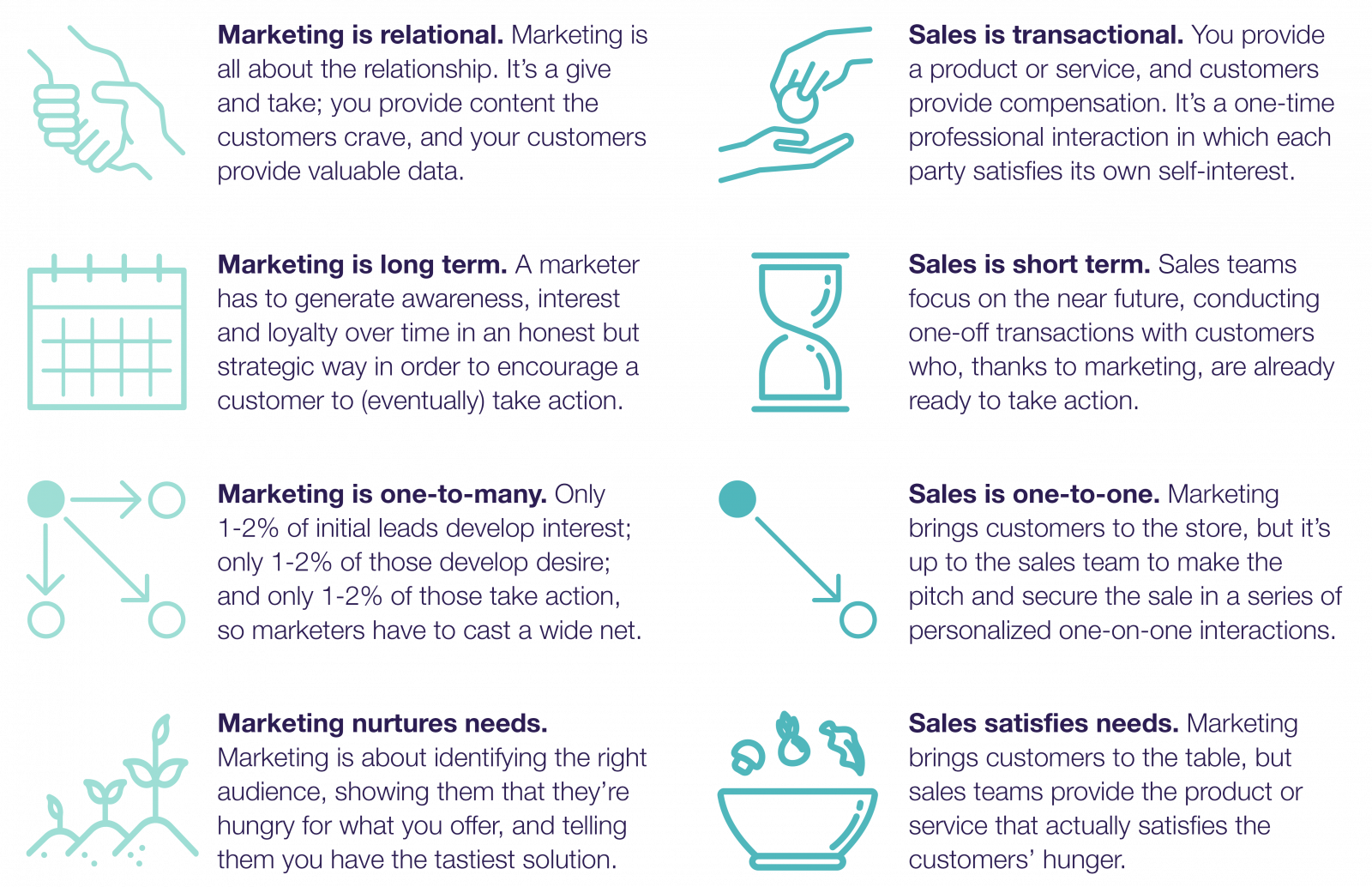The Difference Between Sales and Marketing

Not to sound like a high school English essay, but the dictionary defines marketing as “the act or process of promoting, selling and distributing a product or service.” I rarely disagree with Merriam Webster (I’m a big fan), but as a marketer I have to push back on the “selling and distributing” part of their definition.
For startups and small businesses, sure, marketing and sales may be in the same department. They may even be the same person. However, their functions are different, and those differences are important.
Marketing and selling make an incredible and inseparable duo, but like any good duo, they each have their own personalities and responsibilities.
What’s the difference?
The TL;DR version is this: a marketer is a matchmaker and a salesperson ties the knot. The marketer cultivates the relationship between consumers and the brand, and whenever the consumer is ready to say, “I do,” to your product or service, the salesperson steps in to make it happen.
Let’s break down the differences—and the metaphor—a little more.
Relational vs. Transactional
Marketing is relational. Marketing is all about the relationship. As a marketer, you curate all the little moments that make consumers fall further in love with the product or service. Your metrics of success are driven mostly by people, such as impressions (how many people know you) and NPS (how do people feel about you).
Sales is transactional. Sales is about sealing the deal. Once the consumer and the brand have made their vows—in other words, the consumer has made the purchase—the transaction is complete. (Mazel tov!) As a salesperson, your metrics of success are driven mainly by dollars.
Long-term vs. Short-term
Marketing is long-term. A marketer generates awareness, interest and loyalty over time to encourage customers to take action. For a few people, it will be love at first sight, but for most, it will take time to fall in love with your product or service. In fact, thanks to the pandemic, we’ve seen that it can now take up to 16 touchpoints to make a lead know, like and trust you enough to make a decision.
Sales is short-term. Sales teams focus on the near future, conducting one-off transactions with customers who, thanks to marketing, are already ready to take action. Think about it this way: at a wedding, the officiant isn’t there to make two people like one another; they already like one another before they make it to the ceremony.
One-to-many vs. One-to-one
Marketing is one-to-many. According to a study of 2,000 adults in relationships, it takes an average of 15 kisses, nine dates and six relationships before you find The One. Marketing is a similar process. If only 1-2% of initial leads develop interest, only 1-2% of those develop desire, and only 1-2% of those take action, you have to cast a wide net. With those numbers, marketers have to reach thousands of people in order for salespeople to see one purchase.
Sales is one-to-one. Marketing brings customers to the store, but it’s up to the sales team to secure the transaction. Whereas marketers build the relationship between the market and the brand, salespeople build a direct interpersonal relationship with the consumer. You may know without a doubt you want to get married, but you still want the wedding officiant to be someone you know and trust, right?
Nurturing Needs vs. Satisfying Needs
Marketing nurtures needs. Marketing is about finding the right people, showing them that they need what you have and then telling them you are The One to solve their need—whether they realize they have the need or not.
Sales satisfies needs. Once the marketer has shown the consumer that they’re meant to be together with the product or service, the salesperson makes it so.
But what about…?
Marketers can make sales, and salespeople can market. It’s true. As with anything, there’s some gray area in the marketing versus sales discussion. That area is made even grayer by the prevalence of digital marketing. When a consumer can see an email, a website and a billboard and then click on an ad to make an immediate purchase, doesn’t that mean the marketer is responsible for both marketing and selling? Well, yes. So maybe Merriam-Webster isn’t so far off after all.
However, as a marketer, it’s important to make sure you can deliver what you promise. A marketer can reasonably promise that an ad will receive one million impressions or an email will yield a 30% open rate, but a marketer can’t promise $100,000 in sales because that technically isn’t their role. Matchmakers can set you up on a hundred dates, but they can’t make you fall in love.
Where can I learn more?
You came to the right place. The Elevate My Brand team is made up of marketing (and selling) experts, so we’re more than happy to answer your questions.
If you’re ready to dive right in, let’s schedule a Mindmap session where we walk you through the entire digital marketing universe. If you’re a little shy, that’s okay too. We can set up a complimentary consultation with our CEO, Laurel Mintz. Either way, you can’t go wrong!
